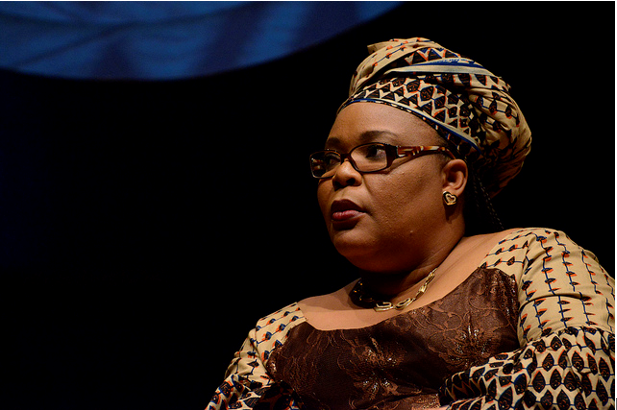
By Tiffany Westry
UAB News

Liberian peace and women’s rights activist and Nobel Peace Prize laureate Leymah Gbowee will give a lecture at the University of Alabama at Birmingham on Thursday, Sept. 29. The free public event, which marks the opening of the UAB Institute for Human Rights, will take place at the UAB Alys Stephens Center located at 1200 10th Avenue South at 6 p.m.
Gbowee was awarded the 2011 Nobel Peace Prize for leading a nonviolent movement that brought together more than 3,000 women across ethnic and religious lines. Their efforts brought an end to the Second Liberian Civil War and ensured women’s participation in elections. The historic achievement paved the way for the election of Africa’s first female head of state, Liberian President Ellen Johnson Sirleaf, who was also awarded a Nobel Prize in 2011.
“Leymah Gbowee is a role model for all of us who engage in human rights and peace work,” said Tina Kempin Reuter, Ph.D., director of the UAB Institute for Human Rights. “Her activism for community building, peace, and women’s rights in Liberia is unparalleled and serves as an example of remarkable leadership and successful grassroots efforts. She represents what the UAB Institute for Human Rights has set out to do: to raise awareness and to educate, to research and to find practical solutions for the promotion of human rights and sustainable peace.”
Liberia’s Second Civil War began in 1999. The war brought systematic rape and brutality against women to a country still recovering from the first civil war, which began in 1989 and ended in 1996. Gbowee mobilized an interreligious coalition of Christian and Muslim women and created the Women of Liberia Mass Action for Peace movement. Through her leadership, the women staged pray-ins, a sex strike, and nonviolent protests demanding reconciliation and the revival of high-level peace talks. The pressure pushed then-President Charles Taylor into exile. A peace agreement was later signed, ending the war on Aug. 18, 2003. The remarkable effort was chronicled in the documentary “Pray the Devil Back to Hell,” which was named “Best Documentary” in the 2008 Tribeca Film Festival.
In 2006, Gbowee co-founded the Women Peace and Security Network Africa in Accra, Ghana. WIPSEN-A is a nonprofit organization dedicated to promoting women’s strategic participation and leadership in peace and security governance. In 2012, she launched the Gbowee Peace Foundation in Monrovia, Liberia, which provides educational and leadership development opportunities for women, girls and youth. She also serves on the board of directors of the Nobel Women’s Initiative, the PeaceJam Foundation, and serves as a member of the African Women Leaders Network for Reproductive Health and Family Planning.
Since winning the Nobel Peace Prize, Gbowee travels around the world to speak about the devastating effects of war and gender-based violence. She has been featured on a number of international television programs, including on CNN, BBC and France24. She also speaks internationally as an advocate for the high-level inclusion of women in conflict-resolution.
Gbowee is a social worker and trauma counselor who works with ex-child soldiers. She is a single mother of six, and holds master’s and doctor of law degrees in conflict transformations, specialty management and conflict resolution.
The UAB Institute for Human Rights is housed in the UAB College of Arts and Sciences. The institute was established in 2014 to serve as a platform for interdisciplinary collaboration between scholars, educators, students and activists. Its mission is to raise awareness, engage in education, foster research and design initiatives for practical action, resulting in the promotion and protection of human and civil rights locally, nationally, and globally. Tina Kempin Reuter was named the institute’s first director in February 2016.




